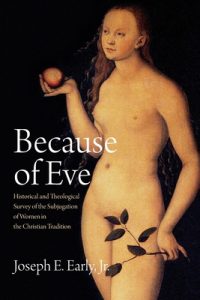Christianity has utilized a biased reading of the sacred biblical texts to privilege men as leaders in church, home and in most vocations. From the Old Testament to the 21st century, men authored, translated and edited most of Scripture and have largely controlled the Catholic and Protestant denominations.
Although women have always been present in and contributed to Christianity over the last 2,000 years, men’s voices and opinions were more valued than those of women.

Joseph Early
The Jesus of the Gospels in no way subjugates women. Rather, he goes out of his way to minister to, care for and heal women, many of whom were not even Jewish, throughout his ministry. The fact that women were the first to announce the good news of his resurrection highlights their importance to the kingdom of God. Moreover, Jesus’ message speaks equality for all people.
When women were equal to men
The earliest letters attributed to Paul appear to promote an egalitarian church given the imminent return of Christ. When this did not happen, the later letters modify the treatment of women to make Christianity more palatable to the Romans who looked upon the Christians with suspicion.
For a few years, women were equal to men. Church authorities used these later Pauline letters to subjugate women while interpreting earlier passages like Galatians 3:28 as an event that will happen in the world to come.
Women have preached and ministered throughout history, but when a denomination wanted to appear more similar to other established Christian organizations, the men in charge forced women to take a step back. Christianity followed the norms of patriarchal culture and state to gain acceptance and favor since Paul’s time.
“These men had Christ’s teachings to rely upon, and he placed no limitations upon women. Jesus came to bring freedom and salvation to everyone, including women.”
Those who knew about my research for my book, Because of Eve, have asked me if the men of these different eras were just following the strictures of their culture and times. If so, they suggested, perhaps I should not judge them harshly for echoing societal beliefs. My answer is that Christian men should have a responsibility to be better than societal norms. These men had Christ’s teachings to rely upon, and he placed no limitations upon women. Jesus came to bring freedom and salvation to everyone, including women.
Women as scapegoats
Christianity also uses women as scapegoats, starting with the first woman. Why is there sin in the world? It is because Eve was first in the Fall. Why do men fall into sexual sin? It is because Eve tempted Adam, and all women are, thus, temptresses. Why is sex bad? Because there was no sex in the Garden of Eden before the Fall. Eve tempted Adam to have sex before God determined the timing for sex was correct. Sex, therefore, is bad, and women are the cause of it and crave it. Even the angels desire them. Why can’t men trust women? Because Eve deceived Adam. Why can’t women be leaders? Because a woman led man into sin. Why did the plague destroy our crops? Because of witches. Why can’t my wife and I have a baby? A woman placed a curse on us. Why is society so fragmented today? It is because women left the home to work and neglected their children. Why do husbands have affairs? It is because their wives are not taking care of their sexual needs. Why don’t I have a satisfying marriage and all we do is fight? It is because God created the woman second, and she is not being subservient.
Over the centuries, Christianity also has depicted women as mentally inferior to men. They do not have the intelligence to leave the home, gain employment or serve in leadership roles in society. This concept does not appear in the New Testament. Even in the Old Testament in which men used women as tools for their advancement, the stories rarely depict women as weak-minded.
“The belief that women are not mentally fit for anything beyond being a wife and mother has its roots in Plato and Aristotle rather than Genesis, Jesus and Paul.”
Rather, Old Testament women often appear much more intelligent than their male counterparts. The belief that women are not mentally fit for anything beyond being a wife and mother has its roots in Plato and Aristotle rather than Genesis, Jesus and Paul. Because many church fathers relied heavily on Plato and because the most important theologian of the Middle Ages, Aquinas, relied on Aristotle, this belief found its way into Christian theology.
Women whom men depict as good (saints) or evil (witches) are two sides of the same coin. Throughout history, women who performed in a manner appropriate for their gender were deemed good or saints. The Virgin Mary obediently followed God’s command and served as a mother. Augustine’s mother, Monica, was a doting mother who was beaten by her husband but never left him. In Colonial America, Puritan wives who stayed in their place were called “good wives.” In many evangelical denominations, a woman who stays at home, raises children and cares for her husband is denoted a biblical woman.
These women were recognized as good because they stayed within the roles prescribed to them by men. Evil women did the opposite. They did not conform to gender norms.
Inerrancy and subjugation
In the modern era, biblical inerrancy has attempted to keep women subjugated. The Pauline corpus makes several statements that appear to require women’s silence and submission. The question, however, is what did the letters mean when they were written? Who was the intended audience? These letters were written in a time when women were subservient. Yet, women in the early church led at the highest level as apostles, prophets, teachers, deacons and church planters.
Like women, the church also emancipated slaves. Paul tells Philemon to receive his slave Onesimus as a brother; Onesimus becomes bishop of Ephesus. Even so, denominations such as the Southern Baptist Convention used the same arguments to condone slavery and segregation that they now use to promote complementarianism. It appears hypocritical to denounce one and not the other.
There are many Christian men and women who affirm complementarianism and believe it is the clearest depiction of biblical manhood and womanhood. Wives find strength, leadership and affirmation for their chosen lives in this system. Husbands find comfort, affirmation and a sense of biblical fidelity in wives who have chosen to graciously submit to their authority.
This view works well for many Christian couples. They have faith in their biblical interpretation and live their lives in accordance to it. Many theologians who teach in universities and seminaries that advocate complementarianism see themselves as defenders of orthodoxy and believe their view is the only valid interpretation of biblical manhood and womanhood. As in previous centuries, they often belittle those, especially women, who do not agree with them. I see no end to this practice in the near future.
It’s about control
Control is another aspect that runs the gamut of Christianity. Perhaps out of fear, a lack of empathy for women or belief that men are physically stronger than women, men have always sought to control women. Women cannot touch the sacraments without contaminating them. In order not to tempt monks, nuns should be cloistered. Women must wear conservative clothing.
“It is easier to control a woman who is forbidden to leave the house.”
It is easier to control a woman who is forbidden to leave the house. Therefore, gender roles and spheres have played a large role in men’s attempt to control women. Over the last 30 years, much of it has had to do with the fear of damaging a man’s ego by proving women are equal in work, church and the home. Theologians such as John Piper teach that the man is the breadwinner and the woman should remain at home taking care of children.
Pastors and theologians taught this for hundreds of years, but rather than the belief that the world is too rough for a woman, the fear now is that if the woman makes more money than the man, it will hurt his ego. Piper believes a man’s manliness would be damaged if he had a woman as his drill sergeant.
As gender roles and spheres developed over nearly two millennia, control over women boosted the self-confidence of weak men. As a man, I can affirm that we are fragile. My research, however, has taught me that this condition is neither inherent nor biblical, in much the same way that women are no less worthy than men in God’s eyes and are capable of serving him in whatever leadership position God gifts and calls them as has been the case throughout history.
 Joseph Early is professor of church history, theology and ethics at Campbellsville University in Campbellsville, Ky. He is the author of eight books including The Life and Writings of Thomas Helwys, A Texas Baptist Power Struggle, and Introduction to Christian History. This article is excerpted from his new book, Because of Eve, and is used here by permission of the author.
Joseph Early is professor of church history, theology and ethics at Campbellsville University in Campbellsville, Ky. He is the author of eight books including The Life and Writings of Thomas Helwys, A Texas Baptist Power Struggle, and Introduction to Christian History. This article is excerpted from his new book, Because of Eve, and is used here by permission of the author.
Related articles:
The Oscars slap and the scapegoating of women | Opinion by Jennifer Garcia Bashaw
From her mouth to God’s ear? Women’s voices, homiletical testosterone and radical redemption | Opinion by Bill Leonard
What does complementarianism have to do with Domestic Violence Awareness Month? | Analysis by Rick Pidcock


